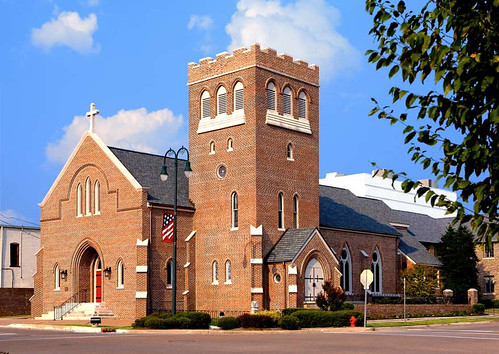 [Episcopal Life] I've had several remarkable visits recently concerned with education and the Episcopal Church. I wrote in this column in February about the conversations going on in the Diocese of Mississippi around the role of Episcopalians in bringing justice to a functionally segregated educational system.
[Episcopal Life] I've had several remarkable visits recently concerned with education and the Episcopal Church. I wrote in this column in February about the conversations going on in the Diocese of Mississippi around the role of Episcopalians in bringing justice to a functionally segregated educational system.I visited the Diocese of Haiti late last fall and saw how that diocese serves 80,000 children and young people in elementary and secondary schools, a university, a music school (which started and maintains the only philharmonic orchestra in Haiti), a nursing school (graduating the first degreed nurses in the country this year) and vocational schools that focus on electronics, business, architectural design and mechanics.
The Diocese of Massachusetts participates in two remarkable schools that serve middle schoolers (fifth through eighth-graders), one just for girls (Esperanza Academy) and one (Epiphany) that serves 85 poor innercity children of color.
Epiphany recruits fifth-graders by lottery from the lowest-performing fifth of public-school students. Those incoming children test at second- or third-grade levels, but by the time they leave eighth grade, they are functioning at 10th-to 11th-grade levels. They do it by addressing the basic human dignity of students and their families in an intensive educational environment, 12 hours a day, five days a week, 11 months of the year.
I've just been in the Diocese of West Tennessee, where I learned about St. Mary's School and the Bridges youth center and visited Emmanuel Episcopal Center, all in Memphis. St. Mary's started in 1847 and today educates more than 800 girls, pre-K through high school, to high academic standards.
Emmanuel owes its roots to an African-American Episcopal Church of the same name, begun more than a century ago. Today, Emmanuel Center includes a worship space and a large gymnasium and serves more than 600 inner-city kids in focused after-school and summer programs. The main center is located in the middle of a public housing project and has grown from the only church that wasn't torn down when the project was built.
The center is 20 years old and continues to increase its service and effectiveness. Kids aged 5 to 19 participate, and in the last two years the center has seen 100 percent high school graduation rates for its seniors.
Last year, 80 percent of them went on to higher education. The Saturday afternoon we visited, the principal of the local elementary school turned up as well – many of her students participate, and they greeted her with open arms and hugs.
Bridges was begun by the Episcopal Church in the 1920s. Its primary focus today is leadership development in the areas of racial reconciliation, poverty, educational challenges and environmental advocacy. The center's building is the first "green" one in Memphis and has been constructed with several startling objectives, including that the building itself teach and that it be surprising.
One meeting room has an unusually shaped large table, built of all the different native woods of Tennessee and shaped so that no seat has an outsized claim to authority. The center's work continues to touch and transform thousands.
Why is education so foundational to our church? Certainly our worship depends on literacy, and early Anglican missionaries always worked to teach reading and writing so that converts would be able to read the Bible and prayer book.
That's only an outward sign, however, of a conviction that salvation includes the whole person. We believe that we serve God with our whole heart and mind and soul and strength.
We also believe that the whole community is the aim of our participation in God's reconciling mission – not just Episcopalians.
Bishop Catherine Roskam of New York and her team came to visit me recently to talk about All Our Children, a movement that seeks to enlist congregations and faith communities across this country to partner with local schools. Children – all of them – need the personal attention and love of adults. At the beginning of every school day at Epiphany School in Boston, the children have to look the director in the eye and shake his hand before they walk into the building. It's a reminder that each one is loved, has
dignity and will be expected to do the best of which she or he is capable.
A resolution concerning All Our Children likely will come to General Convention this summer. It's an invitation to put our baptismal covenant into action – to affirm the dignity of every young human being in the schools in our neighborhoods. Educators consider the involvement of unrelated adults to be an essential asset to children's development into effective and humane adults.
How can you and your congregation share the love of God with children, in a human form they can see and touch?
-- The Most Rev. Katharine Jefferts Schori is presiding bishop of the Episcopal Church.
From Episcopal Life Online


No comments:
Post a Comment